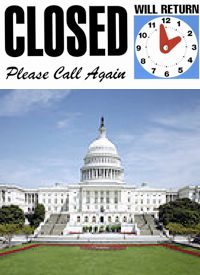
As the rhetoric is increasing, so are the chances for a government shutdown. Following a meeting with House Speaker John Boehner and Senate leader Harry Reid, President Obama expressed his exasperation: "As I’ve said before, we have now matched the number that the speaker originally sought. The only question is whether politics or ideology are going to get in the way of preventing a government shutdown."
To clarify, the original “number” was $61 billion in cuts, passed by the House in March. The Democrats offered $10 billion in cuts initially, and then raised it to $33 billion. Boehner suggested he could “sell” $40 billion in cuts to the House as a compromise, $7 billion more than the Democrats are offering, but $21 billion less than the House wanted. And so, pick a number. It’s a game.
Boehner retorted to the President’s exasperation: “We’re not going to allow the Senate, nor the White House, to put us in a box where we have to make [a] choice between two bad options — cutting a bad deal this week in order to keep the government open, or allowing the government to shut down due to Senate inaction.”
Harry Reid added his thoughts: “I’m not optimistic. No, I’m not. We have been very willing to do what is fair in ratcheting down very, very hard on [domestic spending] … We can’t go any more … I hope the Republicans do what the country needs, not what the Tea Party wants.”
Some call it a “game of brinkmanship” while others call it a game of chicken: he who blinks first, loses. Time is running out. Unless someone blinks, the shutdown of the federal government will begin Friday at midnight. The President weighed in on just how serious a shutdown would be:
This is not an abstraction. People don’t get their Social Security checks. They don’t get their veterans payments. Basic functions shut down. And it — that, also, would have an adverse effect on our economic recovery.
Favoring rhetoric over accuracy once again, the President is making an ulcer out of a pimple. The last time the government was shut down was in 1995 in somewhat similar circumstances. President Bill Clinton vetoed a spending bill that had been passed by both the House and Senate. When no agreement could be reached, the government suspended “non-essential” service workers on furlough for five days in November, and another 21 days in December into January, 1996.
About 284,000 workers out of 3 million government employees were affected directly, or less than 10 percent of the government workforce. Many were told not to go to work. Others were sent home after a few hours. All of them were paid when the government started back up.
Some make a shutdown sound mighty scary. The Washington Post wrote that:
If President Obama and congressional Republicans do not reach an agreement … some military veterans might not receive benefits checks and other Americans would be unable to apply for Social Security. The State Department might not issue new passports, unemployment statistics would not [be] published as scheduled, museums and national parks would close, and worse — piles of elephant manure might pile up in a National Zoo parking lot because workers can’t ship it away for composting.
In 1995, here is what really happened during those 26 days of government “shutdown”: New patients weren’t accepted into clinical research at the National Institute of Health, toxic waste clean-up was halted at 609 sites nationwide, national monuments and museums were closed, and 368 National Park Service sites were shut, inconveniencing some tourists. And about 200,000 passport applications were delayed in getting processed.
And the President knows it. According to The Washington Post, “Obama would be given wide discretion to determine just what to keep open and it’s likely [that] many employees of the Departments of Defense, Homeland Security, Justice, State and Veterans Affairs would stay on the job to keep national security and defense concerns running smoothly. ” The U.S. Mint and Postal Service would continue to operate.
As Gary North put it in his members-only newsletter:
There will be no major disruptions. It’s all for show. The budget will not be cut [by] much, and the system will roll on, gathering debt like an avalanche gathers snow as it races down the mountain.
And those Social Security checks and veterans benefits payments? They are all automated now, and so they won’t be affected regardless.



